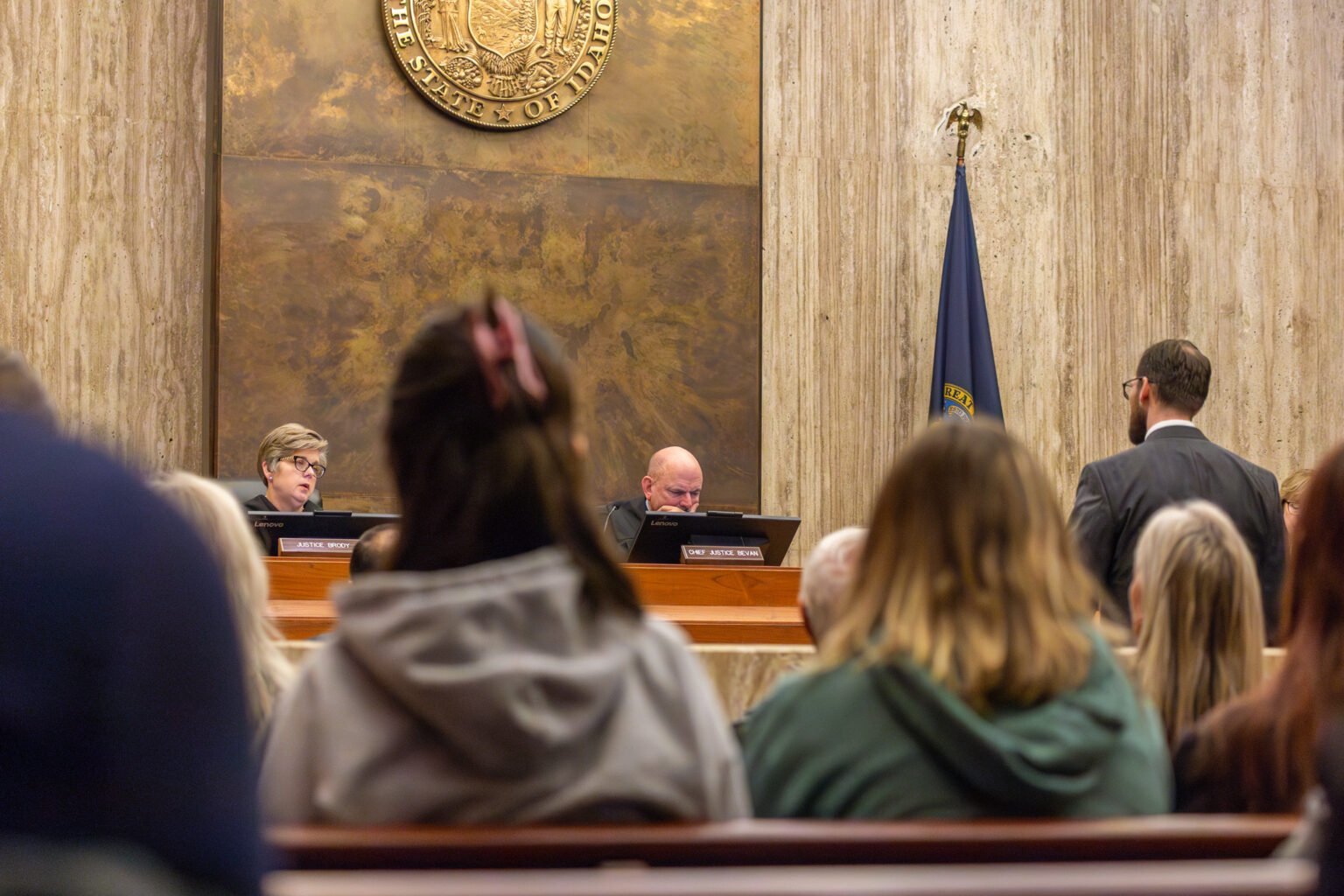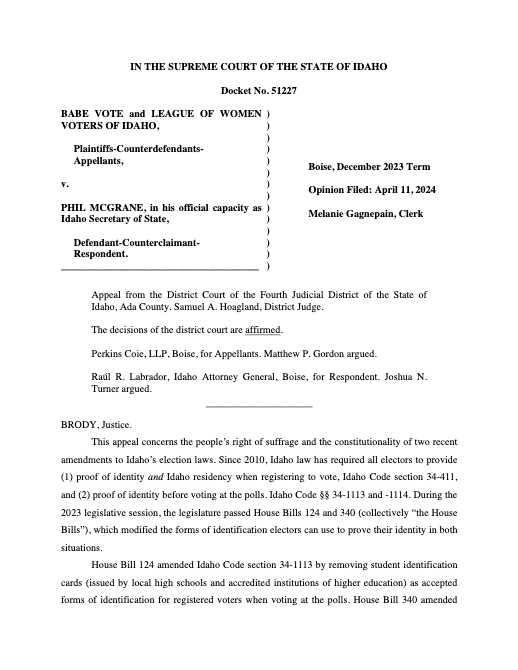Idaho voter identification lawsuit comes to an end after Idaho Supreme Court ruling
Court’s decision comes one year after Babe Vote and the League of Women Voters sued the state for the passage of two laws related to voter identification
Idaho Supreme Court Justices Robyn Brody, left, and Chief Justice G. Richard Bevan, right, listen to oral arguments in court from attorneys representing Babe Vote and the League of Women Voters in a lawsuit targeting an Idaho law that removed student identification cards as acceptable voter registration documents.
The Idaho Supreme Court on Thursday unanimously affirmed a district court’s decision to dismiss a lawsuit related to two Idaho voting laws passed during the 2023 legislative session — effectively bringing an end to the lawsuit.
The decision comes nearly one year after voter advocacy groups, Babe Vote and the League of Women Voters, sued the state of Idaho for its passage of two bills — House Bills 124 and 340 — which modified forms of identification accepted when registering to vote and voting at the polls.
House Bill 124, which took effect in January, removed student identification cards as an accepted form of identification when voting at the polls.
House Bill 340 has been in effect since July, and it changed the identification and residency documentation requirements. It added methods for a person to prove their identity including an Idaho’s driver’s license or identification card — which previously only the number was required — a passport or other federal identification card, a tribal identification card or a state license to carry a concealed weapon.
Lastly, House Bill 340 set provisions for the state to provide no-fee identification cards that can be used to register to vote for adults who have not possessed a driver’s license within the last six months.
According to court documents, the Idaho Supreme Court upheld the district court’s decision because the Idaho Constitution permits the Legislature to enact additional “qualifications, limitations and conditions” on the right of suffrage. The court found that the laws do not discriminate against a specific group of people, and they are related to the government’s interest in preserving election integrity.
The Idaho Secretary of State’s office in a press release Thursday afternoon said it is pleased with the court’s decision.
“Voters can have confidence in Idaho’s elections as they head to the polls,” Secretary Phil McGrane said in the press release. “Our office looks forward to collaborating with the League of Women Voters and Babe Vote to encourage more Idahoans to register and actively participate in the upcoming May 21 primary and Nov. 5 general elections.”
Timeline of Babe Vote and League of Women Voters v. Idaho lawsuit
Last year in March, Babe Vote and the League of Women Voters sued the state arguing the laws violate young Idahoan’s constitutional right to equal protection and the right of suffrage under the Idaho Constitution.
A district judge in October ruled in favor of the state, deciding that the laws are constitutional. That decision prompted Babe Vote and the League of Women Voters to appeal the decision to the Idaho Supreme Court. In December, the voter advocacy groups and the state presented their oral arguments to the court.
Matthew Gordon, the attorney representing the plaintiffs, previously said while presenting the oral argument that the laws give the Legislature “unlimited power” to shape the Idaho electorate at the expense of students, senior citizens, people with disabilities and newly arrived Idaho residents who cannot present an Idaho license or identification card upon registering to vote.
Joshua Turner, an attorney representing the state of Idaho, argued against those claims. During the oral argument, Turner said the new laws address voting security and consistency concerns. Student IDs had always been an outlier in comparison to other forms of identification, he said, and the new laws regulate how people vote, not who can.
“Prior to these changes, inconsistencies existed based on whether an individual registered in person, via mail, or online,” the Secretary of State’s office said in the press release Thursday. “The new law ensures uniformity, treating all Idahoans equally during the voter registration process.”
Babe Vote and League of Women Voters speak against Idaho Supreme Court Ruling
Babe Vote on X posted a statement Thursday afternoon objecting the court’s decision. The organization said the ruling “validates voter suppression and undermines democracy in Idaho.”
“This legislature has tried virtually everything in its power to prevent young, disabled, homebound and working class Idahoans from exercising that right,” the statement reads. “Since these laws were enacted Babe Vote and the League of Women Voters of Idaho have been unable to help approximately 20% of legally eligible Idahoans from completing their voter registration.”
The organization said its volunteers will do everything in its power to register as many voters as it can under the laws, doubling down on efforts to register marginalized voters including young people and the elderly. Starting today, Babe Vote said it plans to mobilize students across Idaho to register people in high schools, college campuses, and senior living facilities to register and educate Idahoans on how to register to vote.
To learn more about upcoming elections or register to vote, visit VoteIdaho.gov.


